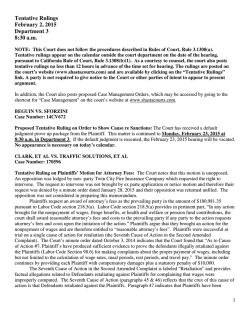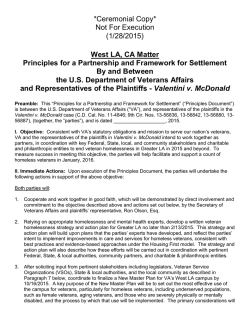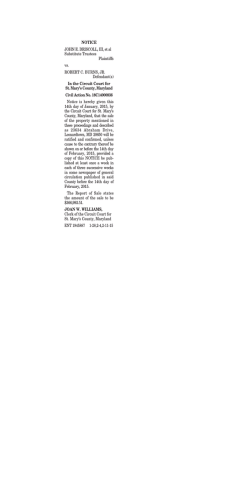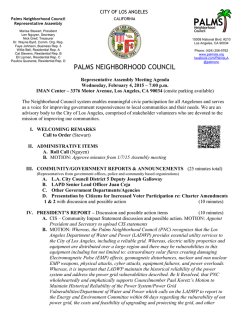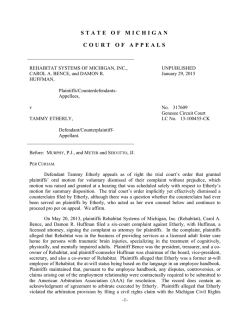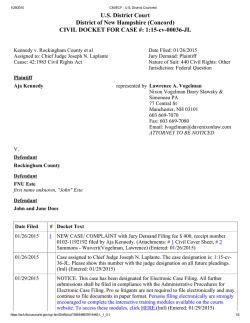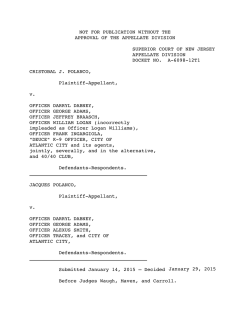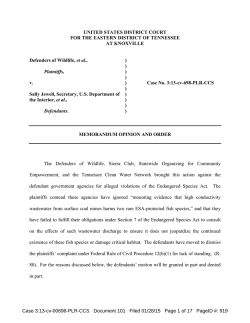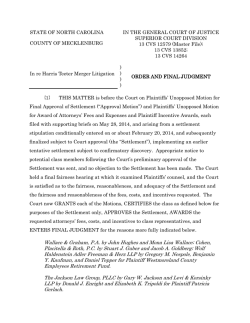
Motion in Limine - Death Care Compliance Law
Case: 4:09-cv-01252-ERW Doc. #: 2215 Filed: 01/29/15 Page: 1 of 21 PageID #: 53738 UNITED STATES DISTRICT COURT EASTERN DISTRICT OF MISSOURI EASTERN DIVISION JO ANN HOWARD & ASSOCIATES, P.C., et al., Plaintiffs, vs. J. DOUGLAS CASSITY, et al., Defendants. ) ) ) ) ) ) ) ) ) ) Case No. 4:09CV01252 ERW MEMORANDUM AND ORDER This matter comes before the Court upon the Missouri Trustees’ Motion in Limine to Exclude Expert Opinions of Robert Hipskind [ECF No. 2158], the Missouri Trustees’ Motion in Limine to Exclude Evidence of or Reference to Their Internal Policies, Procedures, Guidelines, Manuals and Related Documents [ECF No. 2159], the Missouri Trustees’ Motion in Limine to Exclude Expert Opinions of Janice Sackley [ECF No. 2160], the Missouri Trustees’ Motion in Limine to Exclude Evidence of or Reference to FBI Form 302 Reports [ECF No. 2163], the Missouri Trustees’ Motion in Limine to Exclude the Testimony of Pre-Need Contract Consumers, Funeral Home Owners, and NPS Marketing and Training Materials [ECF No. 2164], National City’s Motion in Limine to Exclude Evidence of Shaun R. Hayes’s Post-Allegiant Conduct [ECF No. 2166], the Missouri Trustees’ Motion in Limine to Preclude Testimony and Argument about Statutory Purpose [ECF No. 2167], National City’s Motion in Limine to Exclude Evidence Relating to National City Bank’s Acquisition-Related Due Diligence [ECF No. 2169], the Missouri Trustees’ Joint Motions in Limine [ECF No. 2172], Plaintiffs’ Motions 1 Case: 4:09-cv-01252-ERW Doc. #: 2215 Filed: 01/29/15 Page: 2 of 21 PageID #: 53739 in Limine [ECF No. 2177], and Plaintiffs’ Motion to Exclude Untimely Witnesses Disclosed by Defendant National City Bank [ECF No. 2193]. I. Missouri Trustees’ Motion in Limine to Exclude Expert Opinions of Robert Hipskind, ECF No. 2158 PNC Bank, N.A. (“PNC”) 1 asserts Robert Hipskind is an expert witness disguised as a lay witness. According to PNC, Federal Rule of Evidence 701 prohibits expert opinions of lay witnesses and Mr. Hipskind’s testimony qualifies as an expert opinion because he has no personal knowledge of how Allegiant administered the trusts and will only be testifying as to his opinions of Allegiant’s activity. Therefore, according to PNC, Mr. Hipskind’s expert opinions should be excluded. Plaintiffs argue Mr. Hipskind has personal knowledge of the issues and his testimony is not an expert opinion but instead his personal observations. Federal Rule of Evidence 701 requires lay witness testimony to be rationally based on the witness’s perception, helpful to understanding the testimony or determining a fact in issue, and not based on scientific, technical or other specialized knowledge within the scope of Rule 702. Mr. Hipskind has not been disclosed as an expert witness so his testimony must be limited to the parameters of lay witness testimony. Lay witness testimony based on industry experience is admissible. Burlington N. R.R. Co. v. Nebraska, 802 F.2d 994, 1004-05 (8th Cir. 1986). Based on the representations made at the hearing, Mr. Hipskind’s testimony is proper lay witness testimony and will be admissible. His testimony is based on his own observations and experiences and does not opine on the standard of care or duty of trustees generally. The Court denies PNC’s motion in limine to exclude expert opinions of Robert Hipskind subject to specific deposition objections. 1 PNC is the successor-in-interest to National City Bank and Allegiant Bank and Trust Company. 2 Case: 4:09-cv-01252-ERW Doc. #: 2215 Filed: 01/29/15 Page: 3 of 21 PageID #: 53740 II. Missouri Trustees’ Motion in Limine to Exclude Evidence of or Reference to the Trustees’ Internal Policies, Procedures, Guidelines, Manuals and Related Documents, ECF No. 2159 PNC asserts its internal policies, procedures, guidelines, manuals and related documents are generally inadmissible because they do not establish legal duties and are immaterial to the standard of care under Missouri law. Additionally, PNC claims they have no relevance, they are prejudicial to PNC, and a waste of time because jurors could confuse the internal policies with the legal duty. For these reasons, PNC asserts the internal policies, procedures, guidelines, manuals, and related documents should be excluded from trial. The guidelines, policies, and procedures of a company do not establish the standard of care or duty owed by a defendant. Manzella v. Gilbert-Magill Co., 965 S.W.2d 221, 229 (Mo. Ct. App. 1998). However, this does not preclude this evidence from being admissible. Once Plaintiffs establish the standard of care, the guidelines, policies, procedures or rules of a defendant may be introduced to support negligent conduct. Dine v. Williams, 830 S.W.2d 453, 457 (Mo. Ct. App. 1992). Therefore, this evidence may be admissible if Plaintiffs have already established the applicable standard of care. If any party decides to introduce this evidence, the Court must be notified prior to introduction to address any remaining admissibility concerns. III. Missouri Trustees’ Motion in Limine to Exclude Expert Opinions of Janice Sackley, ECF No. 2160 PNC asserts Janice Sackley is an expert witness disguised as a lay witness. According to PNC, Federal Rule of Evidence 701 prohibits expert opinions of lay witnesses and the testimony elicited by Plaintiffs’ from Ms. Sackley qualifies as expert opinion. PNC asserts questions about trust department due diligence of insurance companies and how trust companies handle payment 3 Case: 4:09-cv-01252-ERW Doc. #: 2215 Filed: 01/29/15 Page: 4 of 21 PageID #: 53741 and recording of insurance premiums goes well beyond personal knowledge. Therefore, PNC argues, Ms. Sackley’s expert opinions should be excluded. Ms. Sackley’s testimony is subject to the same limitations as Mr. Hipskind’s as Ms. Sackley has not been disclosed as an expert witness. Plaintiffs argue Ms. Sackley’s testimony is based on her role identifying red flags when reviewing the trust accounts. It was clear from the examples submitted by the parties during the hearing, Ms. Sackley’s testimony becomes expert testimony when she opines on trusts generally. Portions of Ms. Sackley’s testimony likely will not be admissible, but the Court will need to make these determinations when deposition objections are reviewed. IV. Missouri Trustees’ Motion in Limine to Exclude Evidence of or Reference to FBI Form 302 Reports, ECF No. 2163 PNC asserts FBI 302 reports are inadmissible hearsay because they are memorandum summarizing witness interviews by FBI agents and government investigators. PNC claims two exceptions to the hearsay rule are needed because the agent’s memorandum is hearsay and the witness’s statements within the memorandum are hearsay. Further, PNC states no exception to the hearsay rule exists for these documents. PNC argues these reports cannot be used for impeachment because they are not the statements of the witness, and they cannot be used to refresh a witness’s recollection because the witness did not author the report or adopt the statements. Lastly, PNC states the reports are unduly prejudicial because they imply PNC is guilty of criminal wrongdoing. During the hearing, it became clear this motion is not limited to the admissibility of FBI 302 reports but includes all memorandums of interviews by any government investigator. These reports have hearsay problems that cannot be overcome, as the parties have indicated no 4 Case: 4:09-cv-01252-ERW Doc. #: 2215 Filed: 01/29/15 Page: 5 of 21 PageID #: 53742 government investigators will be testifying. The reports may not be admitted into evidence or read to the jury. U.S. v. Hawley, 562 F. Supp. 2d 1017, 1050-52 (N.D. Iowa 2008). The reports may be used to impeach a witness or refresh the witness’s recollection but the proper foundation must be laid before using the reports. Id. The use of these reports, even solely for impeachment or refreshing a witness’s recollection, can be highly prejudicial because of the implication the witness was involved in wrongdoing, simply because the witness was interviewed by a government investigator. Federal Rule of Evidence 403 allows a court to exclude evidence “if its probative value is substantially outweighed by a danger of one or more of the following: unfair prejudice, confusing the issues, misleading the jury, undue delay, wasting time, or needlessly presenting cumulative evidence.” This evidence has the potential for its prejudice to outweigh its probative value. 2 The reports may be used to impeach a witness or refresh a witness’s recollection. No party will be allowed to refer to the reports by name or ask a witness questions such as, “Do you remember being interviewed by the IRS?” This is a fine line to draw but it is needed to avoid undue prejudice. If a witness states he does not remember the prior statement, the party will not be allowed to introduce the statement into evidence. Before either party attempts to use the reports, the Court must be advised so specific instructions to counsel may be given on their limited use, to ensure prejudicial language is not used and the proper foundation has been laid. V. 2 Missouri Trustees’ Motion in Limine to Exclude the Testimony of Pre-Need Consumers, Funeral Home Owners, and NPS Marketing and Training Materials, ECF No. 2164 Unfair prejudice means “an undue tendency to suggest decision is on an improper basis, commonly, though not necessarily an emotional one.” U.S. v. Condon, 720 F.3d 748, 755 (8th Cir. 2013) (quoting Firemen’s Fund Ins. Co. v. Thien, 63 F.3d 754, 758 (8th Cir. 1995). “Evidence is not unfairly prejudicial because it tends to prove guilt, but because it tends to encourage the jury to find guilt from improper reasoning.” Id. 5 Case: 4:09-cv-01252-ERW Doc. #: 2215 Filed: 01/29/15 Page: 6 of 21 PageID #: 53743 PNC asserts the testimony of consumers and funeral home owners is not relevant and is unduly prejudicial because the statements made by NPS to the customers are not attributable to PNC. PNC argues compliance by Allegiant is not measured by the personal expectations of the customers and there is a risk the jurors will decide the case based on sympathy and emotion rather than facts. Additionally, PNC argues the funeral home owners should not be allowed to testify because their testimony is not relevant and would be unduly prejudicial for the same reasons. Lastly, PNC claims NPS marketing and training materials should be excluded because they are not relevant and would be unduly prejudicial because they are not attributable to PNC and do not determine if Allegiant fulfilled the standard of care. Limited testimony is admissible by consumers and funeral homes owners. Plaintiffs must be allowed to explain how the pre-need service contract was initiated and may do so through consumers and funeral home owners. However, these witnesses will not be allowed to testify as to what NPS promised them or other statements’ made by representatives of NPS. This simply is not relevant as it has no bearing on the trustees’ conduct. 3 At the hearing, Plaintiffs asserted they must be allowed to explain the consumers’ knowledge of the trusts and they must be allowed to explain NPS fulfilled its statutory duties in depositing money into the trusts. Whether NPS put the required amount into the trusts or whether NPS mislead consumers into signing contracts is not relevant to Allegiant’s conduct and alleged negligence or breach of fiduciary duties. This testimony also invites the jurors to make a decision based on emotion and sympathy. Thus, limited testimony will be allowed from the consumers and funeral home owners, but testimony as to NPS’s statements is not admissible. 3 Federal Rule of Evidence 401 states evidence is relevant if “it has a tendency to make a fact more or less probable than it would be without the evidence; and the fact is of consequence in determining the action.” 6 Case: 4:09-cv-01252-ERW Doc. #: 2215 Filed: 01/29/15 Page: 7 of 21 PageID #: 53744 At this time, evidence of NPS marketing and training materials, until further order of the Court, is not admissible because this evidence is not attributable to PNC and is not relevant. VI. National City’s Motion in Limine to Exclude Evidence of Shaun Hayes’s PostAllegiant Conduct, ECF No. 2166 PNC asserts any evidence of Shaun Hayes’s conduct after leaving Allegiant should be excluded because it is not relevant and unduly prejudicial. According to PNC, Mr. Hayes was CEO and President of Allegiant Bank from 1992 until 2004. After leaving Allegiant, Mr. Hayes agreed to a consent order prohibiting him from working in the financial industry because of Mr. Hayes conduct while working at another bank, after he left National City. PNC argues any evidence in this regard can only be used as bad character evidence, not for any legitimate purpose. Additionally, PNC claims Plaintiffs could not satisfy the four prong test to admit character evidence under Rule 404(b) because it is not relevant, not similar in kind, or it’s too remote in time, not supported by sufficient evidence and it is unduly prejudicial. PNC states introduction of this evidence will risk the jury making a decision based on emotion, not facts. Plaintiffs argue it is admissible to attack Mr. Hayes’s credibility as a witness and will only be used as impeachment evidence. The problem with Plaintiffs’ argument is Mr. Hayes is their witness so Plaintiffs’ claim this evidence is solely for impeachment does not make sense. Evidence of prior bad acts is not permissible under Federal Rule of Evidence 404. The evidence may be introduced for limited purposes but must satisfy the following four-part test: “the evidence must be 1) relevant to a material issue; 2) similar in kind and not overly remote in time to the charged crime; 3) supported by sufficient evidence; and 4) such that its potential prejudice does not substantially outweigh its probative value.” U.S. v. Williams, 308 F.3d 833, 837 (8th Cir. 2002). This evidence does not satisfy the four-part test. The consent order does not state 7 Case: 4:09-cv-01252-ERW Doc. #: 2215 Filed: 01/29/15 Page: 8 of 21 PageID #: 53745 any of the facts leading to the judgment so we cannot determine if the Mr. Hayes’s actions are similar in kind to those at issue in this case. For the same reasoning, it is not supported by sufficient evidence. It is not relevant to a material issue and has substantial prejudice as it suggests Mr. Hayes’s conduct while President at Allegiant was improper without any sufficient basis. This evidence is not admissible. The Court grants National City’s Motion in Limine to Exclude Evidence of Shaun Hayes’s Post-Allegiant Conduct. VII. Missouri Trustees’ Motion in Limine to Exclude Testimony and Arguments about Statutory Purpose, ECF No. 2167 PNC asserts the purpose of Chapter 436 should be excluded because it has no probative value as it does not relate to Allegiant’s duties. Additionally, PNC argues it is unduly prejudicial because it invites jurors to revise duties imposed by other statutes in light of Chapter 436’s purpose. PNC claims the fact witnesses are not competent to testify about statutory purpose and statutory purpose is not a proper subject of expert testimony. Plaintiffs argue the Court has already ruled experts may opine on the purpose of Chapter 436 and some explanation of the purpose of the statute is needed to explain the requirements. The Court’s Memorandum and Order on December 1, 2014, does permit expert witnesses to opine as to the purpose of Chapter 436. ECF No. 1972. However, a closer look at Edwards v. Aguillard, cited by National City, reveals the Court should have more explicitly limited expert testimony. 482 U.S. 578, 594-96 (1987). In Edwards, the Supreme Court held postenactment testimony of experts is “of little use” in deciding a legislature’s purpose. Id. at 595. This Court’s prior ruling as to the admissibility of expert testimony of a statute’s purpose was erroneous. Neither parties’ experts will be allowed to opine as to statutory purpose. The parties 8 Case: 4:09-cv-01252-ERW Doc. #: 2215 Filed: 01/29/15 Page: 9 of 21 PageID #: 53746 will be able to introduce Chapter 436 and submit evidence which will allow the jury to conclude if there was compliance with the statute. VIII. National City’s Motion in Limine to Exclude Evidence about National City’s Acquisition-Related Due Diligence, ECF No. 2169 PNC asserts any evidence about acquisition-related due diligence by National City is not relevant and unduly prejudicial because National City was never a trustee and its liability should be judged solely on Allegiant’s conduct. PNC states any information obtained by National City but not communicated to Allegiant is not relevant to whether Allegiant violated its duty as trustee. According to PNC, there is a risk the jury will judge liability on what National City did rather than focus on Allegiant’s fiduciary duties and it will confuse the jury as to the correct standard of care. Plaintiffs assert this evidence is relevant to prove how easy it was to obtain certain information regarding NPS and to show what information Allegiant should have known. This evidence is relevant and probative of causation and what Allegiant should have known during its time as trustee. However, this includes a wide scope of evidence, some of which may not be relevant to these purposes, or any other. Evidence of National City’s due diligence may be admissible. The Court will take up objections to specific exhibits throughout the trial. IX. Missouri Trustees’ Joint Motions in Limine, ECF No. 2172 In its motion, PNC ask the Court for evidentiary rulings on the following seven matters. 1. Taxpayers or Consumers Bearing the Cost of the Guaranty Associations’ Payments under the Liquidation Plan PNC asserts any evidence of taxpayers or consumers bearing the cost of the guaranty associations’ payments under the liquidation plan should be excluded because it is not relevant, unfairly prejudicial, lacks foundation, confuses the issues and misleads the jury. PNC argues this 9 Case: 4:09-cv-01252-ERW Doc. #: 2215 Filed: 01/29/15 Page: 10 of 21 PageID #: 53747 evidence does not make any fact more or less probable and has little to no probative value. PNC claims this is the forbidden golden rule argument which asks the jury to put themselves in the Plaintiffs’ shoes; thus, any evidence in this regard should be excluded. Plaintiffs state they are not intending to make any arguments suggesting the jury should put themselves in Plaintiffs’ shoes. Plaintiffs claim they must be allowed to present evidence explaining the SGAs and to rebut PNC’s claim there are no losses. Evidence and testimony explaining the SGAs is admissible. However, Plaintiffs are not allowed to suggest jury members or taxpayers will bear the costs of the SGAs payments. Arguments appealing to the pecuniary interest of jurors as taxpayers is improper. U.S. v. Palma, 473 F.3d 899, 901 (8th Cir. 2007). 2. Missouri Trustees’ Pre-Acceptance Conduct or Due Diligence PNC asserts the Court’s summary judgment order precludes evidence of Allegiant’s conduct or due diligence before accepting the role of trustee. PNC states the evidence is not relevant, unfairly prejudicial, and misleading or confusing to the jury. PNC claims the jury will decide the case based on conduct before becoming trustee, not on the conduct while trustee. Plaintiffs argue the facts of conduct before becoming trustee give perspective to the conduct while trustee and any potential confusion can be ameliorated with proper jury instructions. This Court ruled the Trustees cannot be liable for pre-acceptance conduct because a duty was not owed to the Plaintiffs before becoming trustee. Introducing evidence of a trustee’s conduct before becoming trustee will only confuse the jury as to what actions the defendants may be liable. Plaintiffs may present evidence beginning on day one of Allegiant’s tenure as 10 Case: 4:09-cv-01252-ERW Doc. #: 2215 Filed: 01/29/15 Page: 11 of 21 PageID #: 53748 trustee but may not present evidence relating to Allegiant’s prior conduct before becoming trustee. 4 PNC’s motion on this point is granted. 3. UMB’s Trust Agreement or Practices under the Trust Agreement At the hearing, PNC withdrew this motion as the parties have agreed evidence of UMB’s trust agreement or practices will not be introduced. 4. Publicity Regarding the 1990s Litigation between NPS and the Missouri Attorney General PNC argues any evidence of publicity regarding the 1990s litigation between NPS and the Missouri Attorney General should be excluded. This evidence includes newspaper articles and any form of publicity about Doug Cassity’s plea. PNC claims any probative value is outweighed by the prejudice to the Trustees. Additionally, PNC states the evidence is hearsay with no applicable exception. Plaintiffs argue the evidence is not hearsay because it is not being used for the truth of the matter asserted. Plaintiffs state this evidence is relevant to Allegiant’s administration of the trusts. The Court does not find this evidence to be unduly prejudicial and if not introduced for the truth of the matter asserted, will be admissible. PNC argues this information was difficult to find and Plaintiffs’ claims this should have been known by Allegiant are too attenuated. The jury may decide if it is reasonable for Allegiant to have discovered this information, not the Court. Arguments as to the evidence’s persuasiveness are left for the jury. The Court denies PNC’s motion on this point. 5. 4 Weiss A.M. Best or Other Ratings of Lincoln and Memorial This does not change the Court’s ruling supra on introduction of evidence related to National City’s acquisitionrelated due diligence. Although the rulings may seem contradictory, the risk of confusion and prejudice with this evidence is substantially higher than with evidence related to National City’s due diligence. 11 Case: 4:09-cv-01252-ERW Doc. #: 2215 Filed: 01/29/15 Page: 12 of 21 PageID #: 53749 PNC asks the Court to exclude any evidence or reference to Weiss A.M. Best or other ratings of Lincoln or Memorial. PNC claims it is not relevant, unfairly prejudicial and is confusing and misleading to the jury because knowledge of the ratings is not necessary to fulfill Allegiant’s duties. PNC states if the Court does not allow evidence relating to reinsurers and the SGAs, then it must also not allow evidence of the ratings of Lincoln and Memorial. Plaintiffs argue when proving negligence, it is necessary to show what a party did and did not do to fulfill its duties. The Court will allow in evidence relating to insurers and SGAs for the reasoning explained infra. The Court will also allow evidence of ratings of Lincoln and Memorial. PNC has not established how this is prejudicial, confusing or misleading. The Court denies PNC’s motion on this point. 6. Lay Opinion Testimony of Travis Ardery PNC asserts the lay opinion testimony of Travis Ardery should be excluded because Mr. Ardery lacks personal knowledge of the facts and has not been disclosed as an expert witness. According to PNC, Mr. Ardery reviewed financial records and summarized the records in the David Wulf’s criminal trial. PNC claims this testimony qualifies as expert testimony and should be excluded for failure to disclose him as an expert. The Court recognizes the significant risk of prejudice because of Mr. Ardery’s position as an IRS agent. However, this prejudice can be alleviated with proper instruction to the jury. Mr. Ardery will be introduced to the jury as an IRS agent who testified in a collateral proceeding. As to objections to his testimony because it is beyond the testimony of a lay witness, the Court finds Mr. Ardery’s testimony, as presented during the hearing, is admissible. Summarizing financial records, even voluminous financial records, is permissible lay testimony 12 Case: 4:09-cv-01252-ERW Doc. #: 2215 Filed: 01/29/15 Page: 13 of 21 PageID #: 53750 under Rule 701. U.S. v. Hamaker, 455 F.3d 1316, 1331-32 (11th Cir. 2006); see also U.S. v. Caballero, 277 F.3d 1235, 1247 (10th Cir. 2002). Mr. Ardery will not be able to opine on the significance of the numbers. Plaintiffs shall not present him to the jury as an expert. Plaintiffs shall disclose to defendants which summary exhibits will be used during Mr. Ardery’s testimony to PNC by Monday, February 2, 2015. 7. Policy Loans Caused Title to the Entire Insurance Policy to be Transferred to Lincoln At the hearing, PNC withdrew this motion as premature. X. Plaintiffs’ Motions in Limine, ECF No. 2177 In its motion, Plaintiffs ask the Court for evidentiary rulings on the following eleven matters. 1. Actions Taken or Not Taken by Regulators Plaintiffs assert evidence of actions taken or not taken by regulators should be excluded. According to Plaintiffs, the Court already ruled in prior orders the regulators’ conduct is not relevant to defendants’ liability. Plaintiffs claim fault is only apportioned among those defendants at trial and any probative value is outweighed by undue prejudice. Additionally, Plaintiffs argue this evidence confuses the issues and misleads the jury. At this point, it is unclear what evidence of regulators’ actions will be introduced and the purpose of the evidence. A blanket preclusion of this evidence is not appropriate. Although the parties will not be allowed to argue the regulators’ conduct was improper, there are other permissible uses. As PNC explained in the hearing, this is a heavily regulated industry and excluding any mention of regulators’ actions will leave gaping holes in the evidence presented. Any suggestion the regulators’ actions caused the harm at issue is impermissible. At this time, 13 Case: 4:09-cv-01252-ERW Doc. #: 2215 Filed: 01/29/15 Page: 14 of 21 PageID #: 53751 the Court cannot determine the admissibility of the evidence and will do so throughout the course of the trial as each piece of evidence is presented. 2. Hannover Arbitration Plaintiffs ask the Court to exclude any evidence or reference to the Hannover Arbitration between Lincoln and Hannover Life Reassurance Company of America (“Hannover”). Plaintiffs state the Court already struck PNC’s defense involving the arbitration and introduction of the evidence at trial is simply an attempt to revive this affirmative defense. Plaintiffs argue it has no relevance, will cause jury confusion and will result in a mini-trial of the arbitration. PNC argued at the hearing this evidence is necessary and admissible to dispute Allegiant was the proximate cause of Plaintiffs’ harm. PNC asserted Lincoln’s insolvency was caused by the loss of its reinsurance through Hannover. PNC is allowed to introduce evidence of the dispute between Lincoln and Hannover, only on the issue of causation, not to mitigate its damages. The Court does not believe introduction of this evidence will result in a mini-trial of the arbitration because the validity of the arbitration is not at issue. Based on PNC’s representations at the hearing, arguments about the validity of the arbitration are not needed to assert the result caused Lincoln’s insolvency. PNC will not be allowed to suggest or argue the decisions of the Texas Receivership Court were incorrect. A collateral attack on the Receivership Court will not be permitted. Plaintiffs’ motion on this point is denied, in part. 3. Evidence or Arguments Contrary to the Court’s Prior Orders Plaintiffs assert any evidence contrary to the Court’s prior orders should be excluded. According to Plaintiffs, this evidence includes the in pari delicto and authorization defenses, any suggestion liability is limited to amounts in the trust, reference to investment advisor defenses 14 Case: 4:09-cv-01252-ERW Doc. #: 2215 Filed: 01/29/15 Page: 15 of 21 PageID #: 53752 inconsistent with prior orders, statute of limitations defenses, and any suggestion NPS was the sole beneficiary of the trusts. At this time, the Court is unable to determine the admissibility of this evidence because it is unclear how the evidence will be introduced and the purpose of the evidence. The Court will address any arguments as to the admissibility of the evidence throughout the course of trial. 4. Fault of Non-Parties Plaintiffs ask the Court to exclude any evidence, argument, or reference to the fault of non-parties. Plaintiffs argue PNC cannot lessen their own liability by pointing fingers at a nonparty. According to Plaintiffs, this evidence is not relevant, unduly prejudicial, and will cause confusion. Plaintiffs also state any arguments regarding intervening causes should be excluded as well. PNC asserts evidence showing fault by non-parties is permissible to dispute Plaintiffs’ claim of proximate cause. In Missouri, a defendant is allowed to introduce evidence which negates Plaintiffs’ negligence claim including evidence of fault of a non-party. Oldaker v. Peters, 817 S.W.2d 245, pin cite (Mo. 1991). A defendant cannot apportion fault with a nonparty, but there is a difference between apportioning fault and introducing evidence someone else was the cause of the harm. Id. PNC may introduce evidence and argument related to the fault of non-parties to challenge Plaintiffs’ establishment of causation. Plaintiffs’ motion on this point is denied. 5. Current and Former Defendants’ Convictions for Bank Fraud and Reference to Missouri Trustees as Victims of Bank Fraud Plaintiffs assert any evidence of current and former defendants’ convictions for bank fraud and any reference to the PNC as a victim of bank fraud should be excluded because it is 15 Case: 4:09-cv-01252-ERW Doc. #: 2215 Filed: 01/29/15 Page: 16 of 21 PageID #: 53753 not relevant to the civil claims at issue and is highly prejudicial. Plaintiffs state PNC has not been harmed by the fraudulent scheme and suggestion they were harmed will mislead and confuse the jury. Evidence of current and former Defendants’ convictions for bank fraud and reference to PNC as a victim of bank fraud is admissible. The evidence is highly relevant and probative to PNC’s defense and assertion it is not the cause of Plaintiffs’ harm. Although the convictions are prejudicial to Plaintiffs, the probative value of the evidence outweighs the prejudice. Plaintiffs’ assertion Allegiant Bank was not a victim of the fraud simply is not true when the charges list Allegiant Bank as the victim. Although Allegiant Bank may not have been allocated restitution in the criminal proceeding, it does not preclude Allegiant from being a named victim. If PNC seeks to introduce evidence it has been characterized as a victim, Plaintiffs may offer evidence showing neither Allegiant, National City, nor PNC were awarded restitution. Plaintiffs’ motion on this point is denied. 6. Presence of Guaranty Associations and/or Reinsurers as Justification for Defendants’ Conduct Plaintiffs ask the Court to exclude any evidence, argument, and reference to the presence of guaranty associations and/or reinsurers as justification for Allegiant’s conduct. Plaintiffs argue the presence of the guaranty association is not relevant as to whether Allegiant breached its duties, and PNC is unable to prove Allegiant even knew the reinsurers existed. Additionally, Plaintiffs assert it will cause undue prejudice, juror confusion, and will result in mini-trials on the issue. PNC argues the existence of the SGAs is not going to be a secret as they are plaintiffs in the case. PNC contends evidence of the presence of reinsurance companies and SGAs is strong evidence life insurance is a safer investment than other options. PNC asserts Plaintiffs cannot 16 Case: 4:09-cv-01252-ERW Doc. #: 2215 Filed: 01/29/15 Page: 17 of 21 PageID #: 53754 argue the life insurance was a risky investment and then exclude any evidence showing it was a safe investment. This evidence is admissible for the purpose of showing the prudency of the investments. It is not permissible for PNC to argue there is no loss to consumers or funeral homes because of the presence of SGAs or reinsurers. Plaintiffs’ motion on this point is denied. 7. Collateral Attack on Orders of Texas Receivership Court Plaintiffs assert PNC should be prohibited from collaterally attacking the orders of the Texas Receivership Court. According to Plaintiffs, this Court has already held a collateral attack is improper so PNC should not be allowed to attack the orders again. PNC states it does not plan to make any of the arguments Plaintiffs are suggesting. At most, PNC claims it will factually explain how the liquidation plan works. No party will be allowed to collaterally attack the orders of the Texas Receivership Court. Any objections to the introduction of evidence relating to the liquidation plan which does not constitute a collateral attack may be raised and decided at trial. Plaintiffs’ motion in limine to exclude a collateral attack on orders of the Texas Receivership Court is granted. 8. Settlement Agreements between Plaintiffs and Former Defendants Plaintiffs assert any settlement agreements between Plaintiffs and former defendants should not be admissible because it implies Plaintiffs have already been compensated and do not need to be compensated from PNC. Plaintiffs claim the agreement itself is not relevant to the issues on trial and it will result in confusion. If the Court admits the agreements, Plaintiffs request the amounts be excluded. Settlement agreements may be used to show bias and prejudice of a witness. Evidence of an agreement and the amount of an agreement is highly probative of a witness’s bias and 17 Case: 4:09-cv-01252-ERW Doc. #: 2215 Filed: 01/29/15 Page: 18 of 21 PageID #: 53755 prejudice. The Court will rule throughout the trial as to the use of a settlement agreement. Prior to using or introducing a settlement agreement or the amount of an agreement, the party must advise the Court and a decision will be made as to its admissibility. 9. Amount of Restitution Owed to Plaintiffs by Criminal Defendants Plaintiffs request the Court exclude any evidence or reference to the amount of restitution owed to Plaintiffs by criminal defendants. Plaintiffs assert the amounts of restitution are not relevant and it is highly prejudicial because Plaintiffs have no realistic chance of collecting the amount from the criminal defendants. PNC argues the amount of criminal restitution is probative of causation and bias and prejudice of witnesses. Further, PNC states it has no intention to argue the amount of restitution bars claims against PNC or to argue Plaintiffs’ have recovered or ever will recover the full amount. The Court finds the probative value of the evidence outweighs the prejudice to Plaintiffs. Plaintiffs’ motion on this point is denied. 10. Missouri Trustees Liability as Successors to Trustees of the NPS Trusts Plaintiffs assert PNC should not be allowed to reference its position as successor-ininterest to a former trustee of the NPS trusts because the only purpose is to intimate PNC should be excused from liability. Plaintiffs argue PNC will gain undue sympathy and confuse the jurors by suggesting they are not responsible when legally PNC is liable for its predecessors-in-interest. Excluding this evidence will be confusing to the jurors. The relationship between Allegiant, National City and PNC must be explained. It would be highly prejudicial not to allow this relationship to be introduced. The parties are allowed to read the agreed upon stipulation to the jury and introduce evidence of the difference between Allegiant, National City, and PNC. Plaintiffs’ motion on this point is denied. 18 Case: 4:09-cv-01252-ERW Doc. #: 2215 Filed: 01/29/15 Page: 19 of 21 PageID #: 53756 11. Judicial Notice of Certain Historical Stock Prices Plaintiffs ask the Court to take judicial notice of the historical stock prices of Dell Computer Corporation, Conseco, Inc., E-Trade Group, Inc., and Arch Communications Group, Inc., for certain time periods in late 2000 to early 2001. PNC does not contest this motion. The Court will take judicial notice of certain historical stock prices submitted by the parties during the trial. XI. Plaintiffs’ Motion to Exclude Untimely Witnesses Disclosed by Defendant National City Bank, ECF No. 2193 Plaintiffs assert PNC disclosed four new witnesses in January which were not previously disclosed. Plaintiffs argue this is prejudicial to Plaintiffs because they have not had a chance to depose the witnesses and do not have any idea what their testimony will be. Plaintiffs contend PNC should be sanctioned for the late disclosure by not allowing the witnesses’ testimony. PNC states the witnesses disclosed are impeachment witnesses and do not have to be disclosed under the Federal Rules of Civil Procedure. PNC claims it disclosed the witnesses as a courtesy but was not required to do so. A party need not disclose impeachment witnesses. Fed. R. Civ. Pro. 26(a)(1)(A). The Court will not sanction PNC for disclosure of witnesses it was not required to disclose. As the parties attain additional contact information for these witnesses, the parties shall continue to share the information as they have previously done in the case. Plaintiffs’ motion is denied. Accordingly, IT IS HEREBY ORDERED that the Missouri Trustees’ Motion in Limine to Exclude Expert Opinions of Robert Hipskind [ECF No. 2158] is DENIED. 19 Case: 4:09-cv-01252-ERW Doc. #: 2215 Filed: 01/29/15 Page: 20 of 21 PageID #: 53757 IT IS FURTHER ORDERED that the Missouri Trustees’ Motion in Limine to Exclude Evidence of or Reference to Their Internal Policies, Procedures, Guidelines, Manuals and Related Documents [ECF No. 2159] is DENIED. IT IS FURTHER ORDERED that the Missouri Trustees’ Motion in Limine to Exclude Expert Opinions of Janice Sackley [ECF No. 2160] is GRANTED in part, and DENIED, in part. IT IS FURTHER ORDERED that the Missouri Trustees’ Motion in Limine to Exclude Evidence of or Reference to FBI Form 302 Reports [ECF No. 2163] is GRANTED in part, and DENIED, in part. IT IS FURTHER ORDERED that the Missouri Trustees’ Motion in Limine to Exclude the Testimony of Pre-Need Contract Consumers, Funeral Home Owners, and NPS Marketing and Training Materials [ECF No. 2164] is GRANTED, in part, and DENIED, in part. IT IS FURTHER ORDERED that National City’s Motion in Limine to Exclude Evidence of Shaun R. Hayes’s Post-Allegiant Conduct [ECF No. 2166] is GRANTED. IT IS FURTHER ORDERED that the Missouri Trustees’ Motion in Limine to Preclude Testimony and Argument about Statutory Purpose [ECF No. 2167] is GRANTED. IT IS FURTHER ORDERED that National City’s Motion in Limine to Exclude Evidence Relating to National City Bank’s Acquisition-Related Due Diligence [ECF No. 2169] is DENIED. IT IS FURTHER ORDERED that the Missouri Trustees’ Joint Motions in Limine [ECF No. 2172] is GRANTED, in part, and DENIED, in part. IT IS FURTHER ORDERED that Plaintiffs’ Motions in Limine [ECF No. 2177] is GRANTED, in part, and DENIED, in part. 20 Case: 4:09-cv-01252-ERW Doc. #: 2215 Filed: 01/29/15 Page: 21 of 21 PageID #: 53758 IT IS FURTHE ORDERED that Plaintiffs’ Motion to Exclude Untimely Witnesses Disclosed by Defendant National City Bank [ECF No. 2193] is DENIED. So Ordered this 29th day of January, 2015. E. RICHARD WEBBER SENIOR UNITED STATES DISTRICT JUDGE 21
© Copyright 2026
